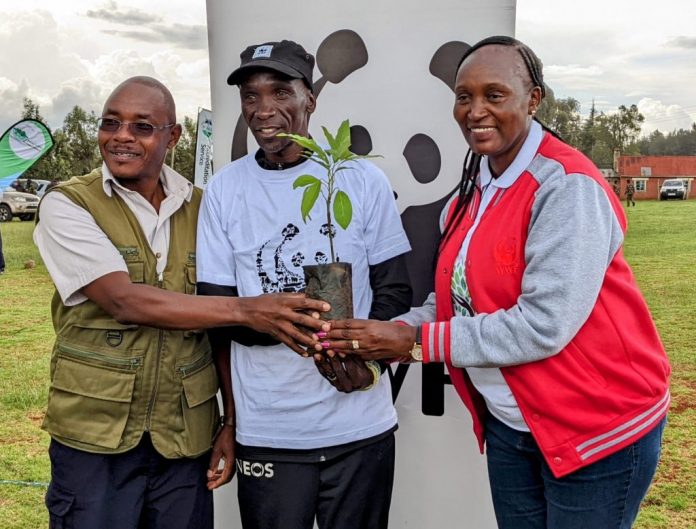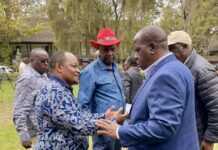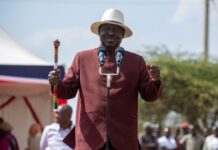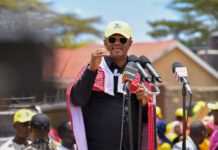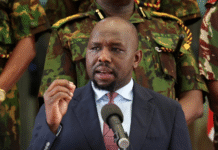Speaking during the rehabilitation of 126 acres of Kaptagat Forest in Elgeyo Marakwet County, the world champion divulged that on the Eluid Kipchoge Foundation bucket list is a plan to adopt a forest in all counties.
“We trust that we shall achieve this dream. I am calling on all like-minded sponsors to partner with us to make Kenya green and make our country happy,” he urged.
Kipchoge who spoke to KBC Digital noted that his prompt to adopt the vast piece of land in his home county is because he is an athlete, needs to breathe good air and also run on soft ground. The only way he says he can achieve these standards is to preserve the environment.
On sports tourism, Kipchoge said that the forest area is home to many athletes from both abroad and within noting that some of them hailed from Japan, the Netherlands and Brazil among other countries.
Most of the sports tourists Kipchoge says have found it a perfect spot for high altitude training and have also gone ahead to become world champions earning the forest even a bigger crest.
The legendary athlete has been challenging individuals, corporate entities and citizens to conserve forests through tree planting activities.
He has also been urging the neighbouring communities to preserve the forest as it is a source of clean water, clean air and a boost to their economic livelihoods.
However, years of degradation and deforestation continue to threaten the Kaptagat ecosystem, depleting its biodiversity and glory.
Jackson Kiplagat, Head of Conservation WWF-Kenya, on community said that although the forest was being fenced, they would still be allowed to graze their livestock albeit in a controlled manner.
“With the help of the Participatory Forest Management Plan, the Community Forest Association and the Kenya Forest Service will work on a formula in which the community can access grass in the area for livestock. Communities will also be able to practice beekeeping within the enclosed forest area to generate income,” he said.
In addition, Kiplagat said that WWF-Kenya was also engaging the community in other projects that include a water project and low-cost biogas solutions.
Delving more into the bio-gas project, the Head of Conservation said that it provides alternative sources of fuel and in turn communities reduce on felling of trees. But, in order for them to get fuel for their biogas emitters, they need to zero graze hence reducing the number of cows they own translating to less grazing in the forest areas.
Ministry of Environment and Forestry Principal Secretary Chris Kiptoo on his part lauded the tree planting initiative by referring to the National Forest Resources Assessment Report 2021 stating that Kenya’s forest cover now stands at 8.8 per cent from 7.2 per cent in 2018.
“Our tree cover is now way ahead of our constitutional target of 10 per cent as we are now at 12.3 per cent,” he said.
The six-month assessment is the first to ever analyse Kenya’s tree cover, which is now at 12.3 per cent.
PS Kiptoo said that the increase is a result of the national strategy for the achievement and maintenance of national tree cover as mandated by the Forest Conservation and Management Act.
Some of the initiatives include national tree planting campaigns, reclamation and restoration of encroached forest areas and ‘adopt a forest’ partnerships in the public and private sectors.
In 2019, Kipchoge signed a Memorandum of Understanding (MoU) with Kenya Forest Service (KFS) to adopt the forest. Under the MoU, he was to rehabilitate and restore the degraded site and later develop the site by establishing a training track and ecotourism site.
Since Kaptagat Forest is a unique ecosystem where people, nature, and the economy interconnect its conservation remains critical hence WWF-Kenya through the UK-Pact and Trillion trees and WWF-UK has donated over Ksh 8.9 million to the Eliud Kipchoge Foundation to facilitate the fencing as well as restoration of the adopted forest.



